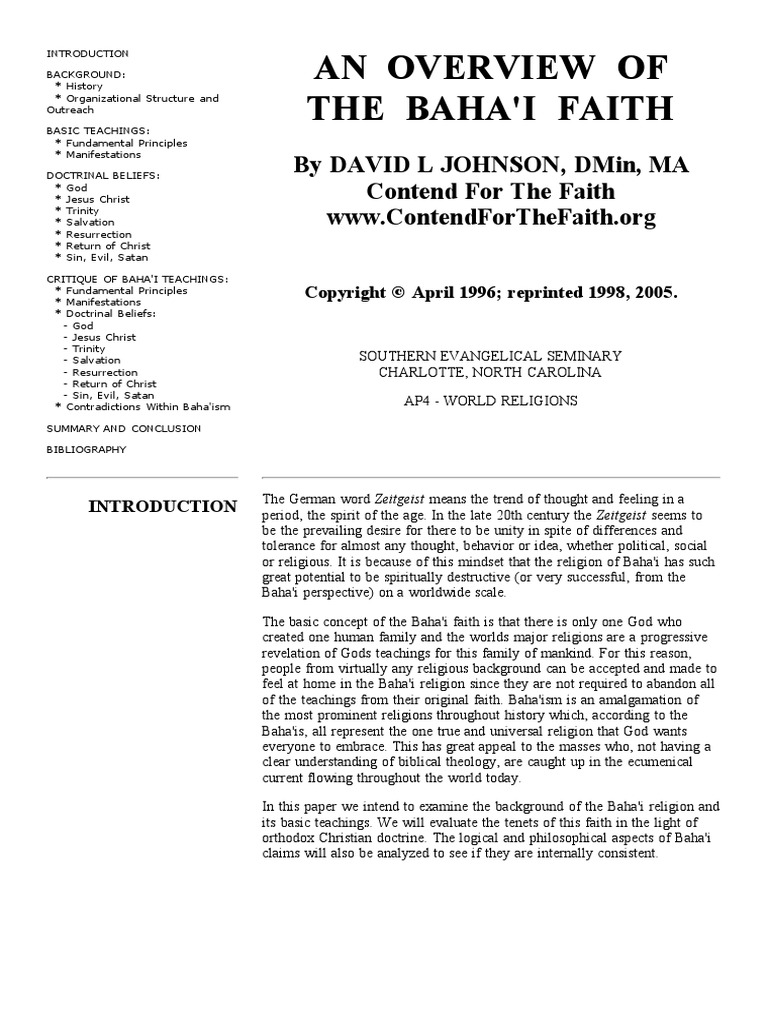In a world that craves understanding, where diverse narratives and beliefs intertwine, the Baha’i Faith emerges as a multifaceted gem, reflecting the essence of unity, love, and progressive revelation. The teachings of this faith, rooted in the revelations of Bahá’u’lláh, invite individuals to transcend the limitations of religion as a source of division. Instead, they advocate for a spiritual symphony that harmonizes the world’s cultures, ideologies, and communities.
The Baha’i Faith can be likened to a vast ocean, where each drop represents the individuality of its followers, yet converges to create a larger body of water—a collective spirit. This oceanic metaphor illustrates the principle of oneness, a cornerstone of Baha’i thought. At its core, the Baha’i Faith posits that all major religions stem from the same divine source, making it essential to view them through a lens of mutual respect and understanding. This singularity offers a profound response to humanity’s search for belonging and purpose amidst stark diversity.
One of the most compelling aspects of the Baha’i teachings is the concept of progressive revelation. This doctrine suggests that God, in His infinite wisdom, reveals His will to humanity in a gradual manner, through a succession of prophets who emerge at pivotal moments in history. Just as the dawn unfolds in hues of gold and crimson, so too has divine instruction appeared, with each manifestation bringing forth clarity and guidance suited to the age in which it emerges. Key figures, such as Moses, Jesus, Muhammad, and most significantly, Bahá’u’lláh himself, have all served as conduits for this celestial message, each adding a new layer to the vast tapestry of spiritual understanding.
Delving deeper into Baha’i teachings, one encounters the tenet of the unity of mankind. This principle highlights the innate connection between all people, underscoring the belief that humanity constitutes a single entity. By cultivating this understanding, Baha’is argue, barriers of prejudice—be they racial, national, or religious in nature—can dissolve. The Baha’i Faith calls for a comprehensive approach to social harmony, advocating for the elimination of extremes of wealth and poverty, thereby promoting a more equitable society.
Moreover, the Baha’i Faith beholds women and men as equal partners in the spiritual evolution of society. It champions the emancipation of women, recognizing their critical role in the development of civilization. This progressive stance resonates with an urgent call to foster a world where gender-based inequities no longer stifle potential but instead amplify the chorus of human achievement. The empowerment of women, therefore, is heralded not just as a matter of justice but as a vital prerequisite for global advancement.
Education, a pivotal theme within Baha’i teachings, is advocated as a fundamental right and an essential tool for individual and societal transformation. Just as a seed requires nurturing to flourish, so too does the human mind require knowledge and experience to expand. Baha’is emphasize the importance of both secular and spiritual education, fervently believing that enlightenment paves the way for social progress. As individuals cultivate their intellect and spirituality, they contribute to the enrichment of communities, ultimately fostering a thriving society.
Another notable element of the Baha’i Faith is its emphasis on consultation, a process akin to the forging of a sword through fire. This iterative communication emphasizes collective decision-making and seeks to incorporate diverse perspectives. The Baha’i model of consultation fosters unity, allowing individuals to transcend personal interests in favor of the greater good. In this light, the imbued spirit of collaboration mirrors the unity that the faith itself propagates, transforming discourse into a sacred act of service.
The Baha’i approach to conflict resolution embodies a spirit of reconciliation rather than retribution. In a world frequently marred by discord and animosity, the teachings advocate for forgiveness and understanding. Baha’is believe that confronting difficulties with a mindset geared toward cooperation can lead to sustainable peace. By fostering compassion, Baha’is aspire to build bridges between individuals and communities, effectively mitigating the strife that too often disrupts societal harmony.
As the Baha’i Faith continues to unfold its narrative through a global community of fervent adherents, it beckons humanity to embrace diversity while sharing a common purpose. By sowing the seeds of love, justice, and unity, it seeks to cultivate a global civilization where every individual can contribute to a magnificent tapestry enriched by myriad threads of existence. In transcending the confines of mere religious doctrine, Baha’i teachings create a compelling framework for moral and spiritual evolution alike.
In summation, the Baha’i Faith is an invitation to explore a world where ideals of unity, equity, and education flourish. It offers a veritable roadmap for personal fulfillment and collective progress, echoing a universal appeal that resonates with the yearnings of humanity. Just as various notes come together to create a symphony, so too can humanity, guided by the Baha’i principles, achieve a harmonious existence.
